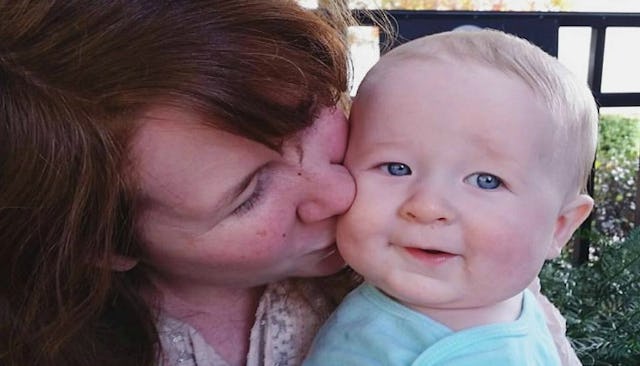Postpartum Depression And Anxiety Was My Painful Secret

This is the face of postpartum depression:
Kimberly Poovey
And this:
Kimberly Poovey
And this:
Kimberly Poovey
Postpartum anxiety and depression doesn’t always look like you think it does, particularly under a good Instagram filter. Surprised? I was.
I had a wonderful birth experience, but it didn’t take long for me to start feeling in over my head. From the moment our beautiful, perfect son was born, he screamed and screamed and screamed until I finally sent him to the nursery four hours later—something I did not plan to do—so I could catch a bit of sleep after being awake for almost 24 hours. (First dose of mom-guilt administered.)
We learned within a week of no sleep, endless frustration, too much lost weight, and buckets of tears that he couldn’t transfer milk effectively, so I had to start exclusively pumping so he could eat. Those first few weeks were the most exhausting and emotional weeks we can remember. Waking him every two hours to eat, pumping around the clock, trying to sleep and take a breath in between, it was a fog of absolute tension and weariness. Not being able to breastfeed in the traditional sense had never even crossed my mind as a possibility, and I really had to grieve that loss.
Two weeks after he was born, I wildly failed an online postpartum depression screening, but figured everyone struggled in the first couple of weeks. I think I cried at some point every single day until he was 3 weeks old. I didn’t know what was normal, but I definitely didn’t feel like myself. I’d never felt more fear in my life, and my long-dormant propensity toward panic attacks awakened with a vengeance. I felt deeply fragile, like I could shatter at any moment.
It was hard. I have spent my whole life doing “hard things”: speaking to crowds of thousands of people, mentoring hundreds of high-risk kids and breaking up fights in the projects, doing outreach to women in the sex industry in the sketchiest places imaginable, participating in a a statewide anti-trafficking task force. But this being a parent thing? It’s the hardest thing I’ve ever done—by a mile.
People asked me all the wrong questions—”Aren’t you just having the most fun ever?!” and “Isn’t it the best?”—which filled me with guilt. I loved my son, truly and with all my heart, but I was also still getting to know both him and this new version of myself. He was a beautiful little stranger, and we were still getting acquainted. It seemed like all my friends with new babies just got it immediately and were glowingly happy and able to cope beautifully right from the start, which was isolating and filled me with more guilt.
When I went for my six-week checkup, there was no postpartum depression screening. My midwife was very dismissive of my concerns and was really not helpful. I called several counselors, but none of them took my insurance. I was so discouraged that I just stopped looking. While I talked to my husband about my feelings and he was very supportive, I didn’t tell anyone else in my life—not even my mom or best friend, whom I talked to every day. The guilt was too intense. I believed the lie that postpartum depression and anxiety meant that I was a bad mom, that I didn’t love my baby enough, and the shame of that lie was crippling. I didn’t see postpartum depression and anxiety as an illness (which it is), but as a personal failure—something that didn’t happen to truly “good moms.”
I waited too long, until about four-months postpartum, to finally find a counselor. I’m so glad I did. I told the people closest to me what I’d been dealing with and was met with nothing but love and support. I rearranged my work schedule so I could be home more and have a better balance between the “old me” and the “new me,” which really helped. I also starting reaching out to other new moms. Spending time with other women in the trenches has been so life-giving. And I started taking medication, which was the right choice for me. It took nearly six months for the fog to begin lifting, and while I’m still on this journey of overcoming, I can honestly say that I adore parenthood. I’m incredibly happy, and I feel like I can cope with the challenges of this new season of life.
If this is where you’re at right now, know this: You are not alone. Being a parent is the hardest thing in the world, but you are a great mom who is doing a great job. It gets easier. I repeat, it gets easier. You figure it out, you get in a groove, and you understand your baby better. They stop screaming for no reason at all. And it really does become fun. You will feel like a human again. You will have date nights and good sex again. You will sleep again. You are not alone.
Moms with postpartum anxiety and depression are great moms who love fiercely, feel deeply, and maybe think a little too much. They are heroes for getting out of bed every day. So if this is you, don’t be afraid to get help. If you broke your leg and refused to go to the doctor because you thought that broken bone was a personal failure and you just needed to “walk it off” and live with the pain, that would be bonkers. Postpartum mood disorders are an illness like any other, and they need treatment to heal.
You are going to be OK. You are loved. You truly are a wonderful mom.
For more information, visit www.postpartumprogress.com.
This article was originally published on